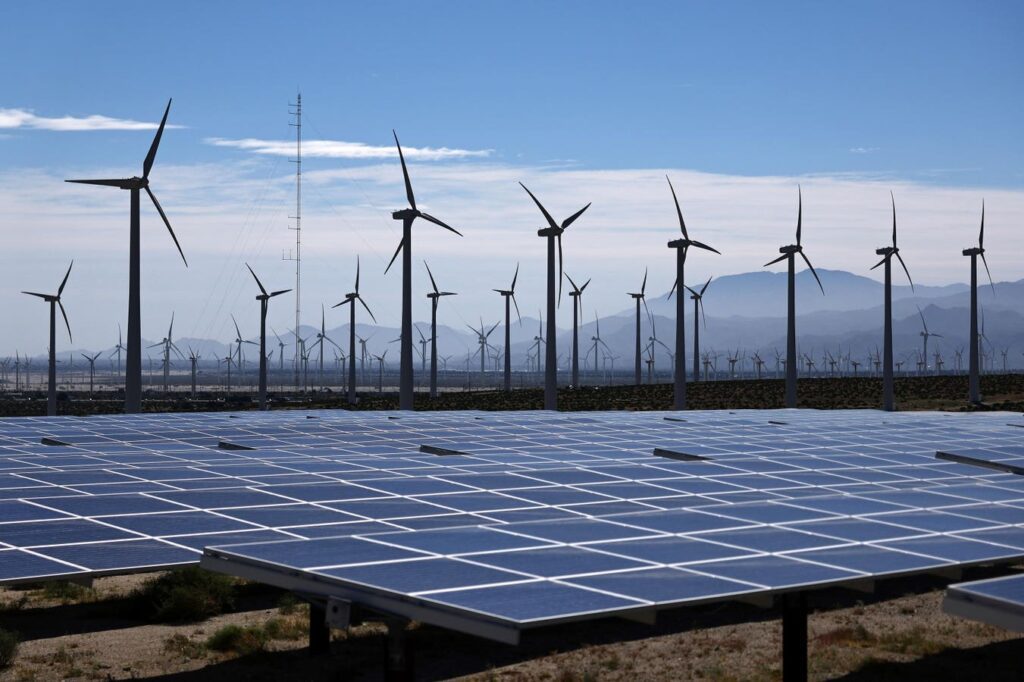Wind turbines operate at a wind farm near solar panels on March 6, 2024 near Palm Springs, … (+)
Blockchain goes beyond cryptocurrencies. By 2026, the blockchain market in the energy sector is expected to exceed $1.5 billion, a huge jump from $127.5 million in 2018. Energy companies see immense potential in this technology, including how it can transform everything from grid management to green energy trading. .
Blockchain is a digital technology that records transactions between parties and stores this information securely in a decentralized system. Multiple participants verify and record the information so that it cannot be changed or falsified. Although blockchain is best known as the key system behind cryptocurrencies like Bitcoin, it can be used for any secure transaction and its applications in the energy sector are growing rapidly.
Today, the energy sector is evolving and utilities are moving away from highly centralized systems (where energy is produced in large power plants and distributed to customers) and toward a more decentralized model. This model is often called “distributed generation”. This shift is driven by the growth of renewable energy sources and innovations such as smart grids and electric vehicles.
With more energy being produced from rooftop solar panels or wind and hydroelectric turbines, utilities are finding new ways to manage and distribute this decentralized energy, and that’s where blockchain plays a role.
Blockchain allows this additional energy to be sold to the local power utility or neighbors without the need for a middleman. In this decentralized model, blockchain is the connectivity agent that guarantees secure and reliable energy transfers from one party to another. For example, rooftop solar panels can produce excess electricity that is not used by the host household and can be sold to other neighbors. This is called peer-to-peer (P2P) energy trading, and it is made possible by the secure, transparent and efficient transaction capabilities of blockchain.
One of the main benefits of blockchain technology in the energy sector is cost reduction. Traditional energy transactions often involve middlemen, which increases overall costs. By eliminating middlemen, blockchain enables direct transactions between parties, reducing unnecessary fees and consumer energy prices. It also makes it easier for energy companies to implement more efficient systems.
Additionally, blockchain improves security by providing a secure and immutable record of energy transactions. This helps create trust between producers and consumers. Knowing that their contributions are accurately tracked and rewarded will encourage more people to participate in green energy programs. The days of the “faulty meter” will soon be over.
A Pacific Gas and Electric smart natural gas meter, part of a smart grid technology program from … (+)
Blockchain technology faces hurdles related to its public image, as many associate it with the energy-intensive cryptocurrency industry. Cryptocurrency mining, which relies on “proof of work” cryptography, is known for using large amounts of energy to solve complex computing problems and produce more currency. In comparison, blockchain solutions being explored for energy applications use more energy-efficient methods, such as “proof of stake.” This makes blockchain viable for utilities looking to improve efficiency without increasing their carbon footprint.
For investors, blockchain in the energy sector comes with risk and opportunity. On the one hand, it is an evolving technology, and its adoption by network operators can be slow, uneven and unpredictable. On the other hand, blockchain can open up new revenue streams, such as selling renewable energy credits on a secure platform, thereby encouraging investments in the proliferation of the technology. Many companies are already investing in blockchain applications in the energy sector, including IBM, Microsoft, Oracle, Google, Engie, Sun Exchange, Siemens and Shell, to name a few.
In the future, blockchain combined with AI could create even more robust energy systems, with AI using real-time data to predict energy needs as blockchain tracks transactions simultaneously, enabling a stable and consumer-centric that adapts to fluctuations in demand. Sound and sophisticated legislation, modernized and user-neutral policies and clear regulatory frameworks are essential for blockchain to become a staple of the energy sector.
The Deploying American Blockchains Act of 2023 reflects a growing desire in Congress to see the United States take a more proactive role as a global leader in blockchain technology. The future of blockchain in the energy sector looks increasingly bright. In Europe, the EU has already recognized the importance of regulatory frameworks for blockchain-based applications, including those in the energy sector.
Blockchain is much more than just a technology supporting cryptocurrency. It has the power to reshape energy markets, making them more decentralized, transparent and efficient. As the long-term future shifts toward cleaner energy and smarter grids, the role of blockchain is set to grow. The participation and support of the US government and businesses in blockchain adoption would enable the country to become a leader in this emerging industry sector.




